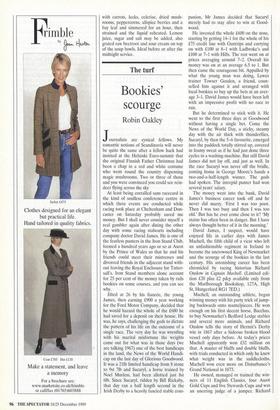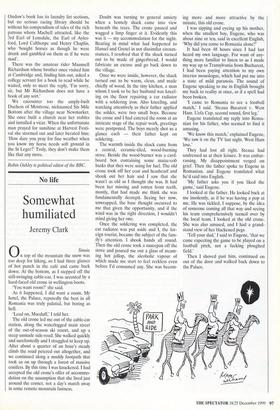The turf
Bookies' scourge
Robin Oakley
Journalists are cynical fellows. My romantic notions of Scandinavia will never be quite the same after a fellow hack had insisted at the Helsinki Euro-summit that the original Finnish Father Christmas had been a chap in a red and white costume who went round the country dispensing magic mushrooms. Two or three of those and you were convinced you could see rein- deer flying across the sky
At least being corralled sans racecard in the kind of soulless conference centre in which these events are conducted while racing took place at Cheltenham and Don- caster on Saturday probably saved me money. But I shall never consider myself a real gambler again after dining the other day with some racing stalwarts including company doctor David James. He is one of the fearless punters in the Iron Stand Club, formed a hundred years ago or so at Ascot by the Prince of Wales so that he and his friends could meet their mistresses and divorced friends in the adjacent stand with- out leaving the Royal Enclosure for Tatter- sall's. Iron Stand members alone account for 25 per cent of the money taken by rails bookies on some courses, and you can see why.
Jilted at 26 by his fiancee, the young James, then earning £900 a year working for the Ford Motor Company, decided that he would hazard the whole of the £600 he had saved for a deposit on their house. He was, he says, challenging the gods to dictate the pattern of his life on the outcome of a single race. The very day he was wrestling with his marital misfortune the weights came out for what was in those days (we are talking 1967) one of the best handicaps in the land, the News of the World Handi- cap on the last day of Glorious Goodwood. It was a 211b limited handicap from 8 stone to 9st 71b and Sucaryl, a horse trained by Noel Murless, had been allotted just 8st 61b. Since Sucaryl, ridden by Bill Rickaby, that day ran a half length second in the Irish Derby to a heavily fancied stable corn-
panion, Mr James decided that Sucaryl merely had to stay alive to win at Good- wood.
He invested the whole £600 on the nose, starting by getting 14-1 for the whole of his £75 credit line with Guntrips and carrying on with £100 at 8-1 with Ladbroke's and £100 at 7-1 with Hills. The rest went on at prices averaging around 7-2. Overall his money was on at an average 6.5 to 1. But then came the courageous bit. Appalled by what the young man was doing, Lewes trainer Towser Gosden, a friend, coun- selled him against it and arranged with local bookies to buy up the bets at an aver- age 3-1. David James would have been left with an impressive profit with no race to run.
But he determined to stick with it. He went to the first three days at Goodwood without having a single bet. Come the News of the World Day, a sticky, steamy day with the air thick with thunderflies, Sucaryl, by then the 5-6 favourite, emerged into the paddock totally stirred up, covered in foamy sweat as if he had just done three cycles in a washing-machine. But still David James did not lay off, and just as well. In the race Sucaryl was never off the bridle, coming home in George Moore's hands a two-and-a-half-length winner. The gods had spoken. The intrepid punter had won several years' salary.
The money went into the bank, David James's business career took off and he never did marry. 'First I was too poor. Then I was too busy and then I was too old.' But has he ever come close to it? 'My status has often been in danger. But I have always thought better of it in the morning.'
David James, I suspect, would have enjoyed life in earlier days with James Machell, the fifth child of a vicar who left an unfashionable regiment in Ireland to become the uncrowned King of Newmarket and the scourge of the bookies in the last century. His astonishing career has been chronicled by racing historian Richard Onslow in Captain Machell. (Limited edi- tion £20 plus £2 p&p available only from the Marlborough Bookshop, 127A, High St, Hungerford RG1 7ED.)
Machell, an outstanding athlete, began winning money with his party trick of jump- ing backwards onto mantelpieces. He won enough on his first decent horse, Bacchus, to buy Newmarket's Bedford Lodge stables and several more animals, and Richard Onslow tells the story of Hermit's Derby win in 1867 after a hideous broken blood vessel only days before. At today's prices Machell apparently won £32 million on that. A master of bluffs and double bluffs, with trials conducted in which only he knew what weight was in the saddlecloths, Machell won even more on Disturbance's Grand National in 1873.
He owned, managed or trained the win- ners of 11 English Classics, four Ascot Gold Cups and five Stewards Cups and was an unerring judge of a jumper. Richard Onslow's book has ith laundry list sections, but no serious racing library should be without his compendium of tales of the rich patrons whom Machell attracted, like the 3rd Earl of Lonsdale, the Earl of Ayles- ford, Lord Calthorpe and Henry Chaplin, who 'bought horses as though he were drunk and gambled on them as if he were mad'.
There was the amateur rider Maunsell Richardson whose brother once visited him at Cambridge and, finding him out, asked a college servant for a book to read while he waited, only to meet the reply, 'I'm sony, sir, but Mr Richardson does not have a book of any sort.'
We encounter too the amply-built Duchess of Montrose, nicknamed Six Mile Bottom after the village near Newmarket. She once built a church near her stables and installed a vicar. When the unfortunate man prayed for sunshine at Harvest Festi- val she stormed out and later berated him: 'How dare you pray for fine weather when you know my horse needs soft ground in the St Leger?' Truly, they don't make them like that any more.
Robin Oakley is political editor oldie BBC.























































































































 Previous page
Previous page